Recently His Eminence Metropolitan Hierotheos of Nafpaktos made the comment that “all other Patriarchates bear the title only through economia and the good pleasure of Constantinople. They are in some sense not full and complete autocephalous Churches, because they exist at the discretion of the Patriarchate of Constantinople and have never been ratified by any Ecumenical Council.”
This does not accurately reflect the authority structure of the Church nor the context of the Ecumenical councils. The Metropolitan’s statement assumes that the decisions of the Ecumenical Councils are the highest authority in the Church. The Patriarch of Serbia, though, is more correct when in his letter to Patriarch Bartholomew (August 13, 2018) he states that the autocephalies of the Churches are grounded in historical circumstances and in the pan-Orthodox agreement of the all the Churches, recognizing these as the main authority.
Met. Heirotheos fails to recognize that an Ecumenical Council has no authority of it’s own. It receives its authority as “ecumenical” by virtue of the whole Church accepting it as authoritative. If the whole Church accepts the current autocephalies as genuine, then no Ecumenical Council is needed. If Constantinople wants to change or abolish the current order he is going against an agreement that already exists. Thus his new order will be the one that will be insubstantial and will not exist as “full” without the approval of all the other Churches. Met. Hierotheos is getting things reversed and putting the “good pleasure” of Constantinople above the “good pleasure” of the whole. Historically and ecclesiologically no one part of the Church has absolute authority or the final say, only the agreement of the whole. Often the initial word of authority comes from somewhere unexpected, someone not immediately in charge (a deacon of Alexandria, a bishop of Ephesus, a monk in the desert) and then the final word is worked out over time as something conciliar. The life, order, and truth of the Church is not the purview of a single Patriarchate nor a single council. Constantinople may have issued the various Tomoi, but historical circumstances and the recognition of the other Churches is what has made the final determination.
I would like to point out that there are two different ecclesiologies floating around right now, and not everyone has really looked at the implications or sources for the views they are holding, so it is good to bring them more into the light. The first view is what might be called the political institutional view of authority in the Church. The source for this view is the example of the way political organizations in the world work. For example in the world the final authority rests with a president and congress, or a supreme court in the judicial area, or it might rest with an autocrat of some type. What is common to all of these is that the final authority rests with a man or group of men at the top of some kind of man-made authority structure.
The political institutional view of the Church postulates an authority structure like this. Authority rests with a particular pan-Orthodox hierarchical-synodal structure such as an Ecumenical or pan-Orthodox council, or in the judicial realm it rests with the Patriarchate of Constantinople, or in the Catholic church it rests with the Pope as an autocrat. While in a nation this reflects the actual self-understanding of a nation’s legal system, the Church has a different self-understanding.
The other ecclesiology understands the Church as a spiritually-Christologically centered structure. Final authority does not rest with some supreme bishop, but rests with the mind of the Church as a whole, which is the mind of Christ. This mind becomes evident over time as a struggle occurs of submitting to the truth of Who Christ is, and His goals, means, and operations.
What does this mean in real life? Well, in the world’s order of things the ruling of a given supreme body is the highest order of things. If the supreme court meets and decides what the law means, that is the end of the story. The only recourse is submission or revolution.
However, the Church has never had any “highest law”—not even the pan-Orthodox councils. Of the pan-Orthodox councils called by the emperors on special occasions some were rejected as robber councils, and some accepted as “Ecumenical”, i.e., as expressing the universal truth of the Church. What authority made the decision of which council to accept and which to reject? Who decides what is the universal truth of the Church? Not the council itself. Not any particular Local Church. Rather a council received authority as ecumenical only after there was the agreement of the Church as a whole. This agreement is something that comes about organically, not through institutional means. As St. Justin Popovich notes, the Church is a Divine-human organism, not a human institution.
Also it is noteworthy that the decisions of an Ecumenical Council are not made authoritative by later councils, but later councils merely confirm what is already recognized and accepted.
Did the term “Theotokos” become an authoritative term for the Virgin only after being confirmed at council? Or was it first authoritative by traditional usage and general agreement, and the council merely recognized this in the midst of Nestorius stirring up confusion? Likewise with the canons. The disciplinary life of the Church is not propagated by the councils as some kind of legal precedent. Rather the disciplinary life of the Church is part of its foundational pastoral and practical life, and the disciplinary canons are put out as responses to particular historical situations in order to help keep this life straight and in order. Unlike a supreme court, or a ruling of congress, the Councils are not a source of legislation, but rather a center of truth around which clarification can happen in the midst of confusion.
In the Church there is space for Christ to act. There is no one supreme political source of authority for creating order, rather Christ’s order as Logos is the basis of Church life—His order built into creation and which finds its most perfect expression in the saints, and which is an active and living presence in the life of the Church. In the Church this order is not promulgated as some man made law, but is recognized and submitted to as being from and of Christ. There is a mutual recognition of Christ in each and all—of the people recognizing Christ in the bishops and obeying them, and the bishops recognizing Christ in each other, and of all recognizing the example and teaching that Christ and the saints have left us about who we are as the Ecclesia.
Historical circumstances also make up part of God’s providential authority that plays into the administrative order for the Church. Constantinople was raised to second place against the wishes of Rome, but this order was eventually accepted as a given part of historical circumstances. The various changes in boundaries, the loss and re-institution of autocephalies has to a larger degree been driven by political circumstances. The Church does what it can to provide both stability and flexibility such that She can best live out her purpose of sanctifying the peoples that She dwells among. But this pastoral and spiritual understanding of Church organization is very different from a political understanding of her organization.
A political organization’s purpose is self-preservation and the increase of its own power. It organizes itself to promote this purpose, and this self-preservation is understood in terms of certain material powers, structures, and resources. The Church’s purpose is to bring about the deification of mankind and ultimately all creation. It organizes itself in such a way as to bring about this goal. Thus part of what determines the organization of the Church is the divine economia.
Economia is not merely some kind of condescension on the part of an authority towards those who are lesser. Economia is rather God’s good household management for bringing about the salvation of mankind. It operates within and despite the changing political circumstances. The flexibility of this economia is shown in how the Russian Church flourished spiritually even when the tsars abolished the Patriarchate making it a synodal Church, and it continued to produce saints when the communists abolished the whole hierarchical power structure. This economia operated even under the Ottoman’s unnatural ways of putting in and getting rid of various patriarchs. Holiness still lived on and thrived there. No one administrative structure is absolute in Church life. Rather there is always an adjustment to whatever good or bad circumstances the Church finds herself in. What is consistent is not an institutional-administrative structure or source of authority, but rather a certain way of life in Christ. It is lack of knowledge of this Way that can cause so much confusion.
In summary we can say that the current autocephalous Churches exist at the discretion and good pleasure of Christ. Their existence was brought about under God’s providence as a result of historical circumstances. They exist according to God’s economia—His decision that this is the best way to witness to and bring about salvation for those under His care. The actions of the Patriarchate of Constantinople were a leading part of this care. However, the new autocephalous Churches exist not solely according to the good pleasure and recognition of Constantinople, but also according to the good pleasure and mutual recognition toward each other. These three: historical circumstances, mutual recognition, and the leadership of Constantinople are what brought about the current situation. If Constantinople pulls its approval, this doesn’t invalidate the existence of any autocephalous Church, but merely puts things in a confused situation like a three-legged stool with one leg broken that is no longer stable. A council is not needed to approve what already exists and is agreed upon and there is no contention over. A council is only needed when confusion is brought in, and then the job of the council is to pinpoint and restrain the source of confusion, protecting the good order and truth of the Church.
I can sympathize with the Metropolitan though. No doubt Constantinople could wreak a lot of havoc in the Greek Church and maybe this is what Met. Hierotheos is trying to say. He is afraid that if his Church does not cooperate, the CP could even decide to revoke its Tomos. Let us keep our Greek brothers and sisters in prayer, since so much pressure is on them, and let us also trust that God will guide them. I am the first one to admit that I don’t understand the ins and outs of the struggles going on internally there. But ultimately Christ will support those who are struggling toward Him, and He will guard all those who are His.

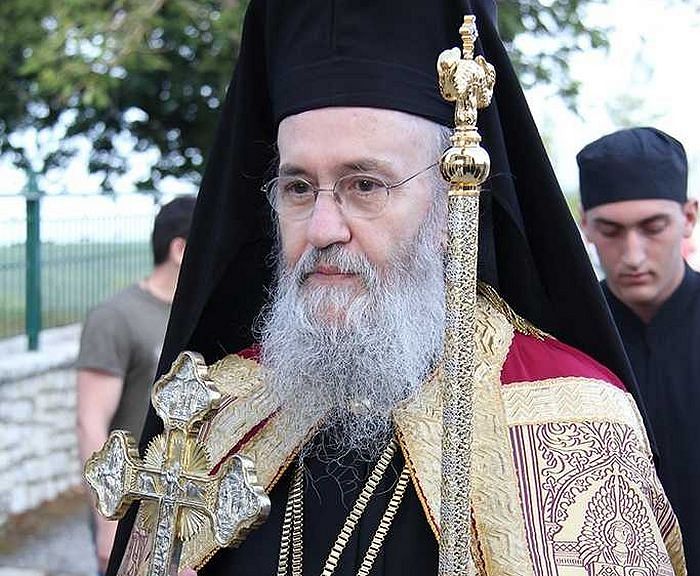
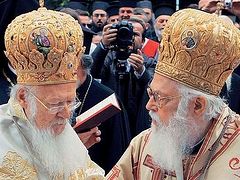
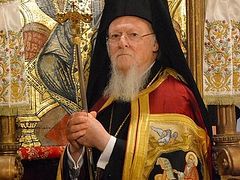

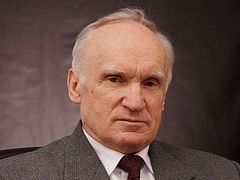
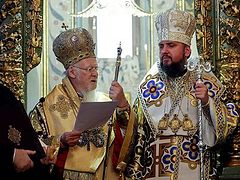
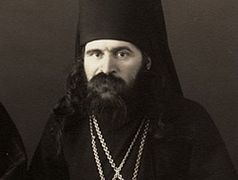
You say "I may be just a simple layman and no expert in canon law"
Well, if you carefully read the Canons, i.e. both the letter of the Canons plus the spirit/logic of the Canons (why the were made)
and if you also read the first history of the Church
then you will understand what our Bishops are really expected to do
and compare with the wrong application by some of them.
You can then politely draw their attention to correct themselves.
Download from:
Ecclesiastical History:
https://archive.org/details/eusebiuspamphilu00euseuoft/page/n8
The Rudder (Pedalion), compilation of all canons of the Church:
http://www.reu.org/public/rudder/rudder.htm
For those of us who are converts to Orthodoxy we are very grateful for people like you and others taking the time to critique erring Hierarchs.
I may be just a simple layman and no expert in canon law. The way I see it is Patriarch Bartholomew is clearly in error and it appears that he loves power more than Christ by his actions.
Every Bishop in our Church is equal and I desperately hope and pray that a Council is called with all the Bishops to settle these issues and restore good order to the Church.
May Christ our True God and Head have mercy on us and help us!
May I humbly add some more info you might want in a future update?
From Rudder (Pedalion), p.273:
"the Bishop of Constantinople ought to receive priviledges of authority because various Patriarchs and Prelatesused to come to the Emperor to beg for his help in their exigencies and it was necessary for them first to meet the Bishop of Constantinople, ...to lend them assistance, and through him they were enabled to approach the Emperor..."
Nowadays, Constantinople is not the capital and Turkey has not may O.Christians. So in the spirit of Canon 28, Constantinople or even the capital Ankara e.g. an Orthodox Bishop from the U.S. or Russia or Greece etc.
Disappointing from one who has guided us seekers and lovers of truth into Holy Orthodoxy. After all, he's only human.
Met. Hierotheos should re-familiarize himself with St. John's very accurate analysis of the EP.See link below:
http://orthochristian.com/115619.html
"The ecclesiology you're espousing is without question foreign to Orthodoxy, will inevitably pit saint against saint, synod against synod and result, not in cohesion but fragmentation. Stop reading and propagating pop Orthodox theology – it's garbage!"
To me, it sounded as if he was attacking you for espousing a foreign ecclesiology and propagating pop Orthodox theological garbage. I interpreted that as an ad hominem attack. But if you do not interpret it in that way...I stand corrected. However, I see it as extremely uncharitable.
For the record, I would like to thank you the most reasoned response to date regarding the Metropolitan's comments.
write a comment like the one signed by "Fr.Daniel".
It is very easy for him to write "it's garbage" but it is more difficult to document this.
Has he ever read the Rudder compiled by Saint Nikodemos, Rule 28 of the 4th Ecum. Synod?
The Rule itself but especially the commentary by St.Nikodemos explains in detail:
The reason Constantinople was the the throne of the Ecumenical Patriarch was only because
there was the throne of the Head of State (Emperor) of the christian nation.
Even a child in Elementary School understands that Constantinople is no more a capital of
a country and certainly Turkey is n
There is no saint....there is no synod.....which would support the EP's innovative "first without equal" mindset. Perhaps it would be best for you to return to your "never comment rule" instead of hurling ad hominem attacks.